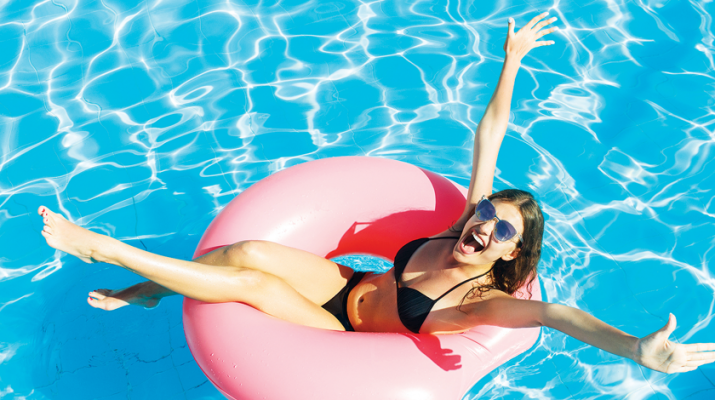Jump, dive, or slide into summer: Keep safety in mind
By Barbara Pierce
Who doesn’t love summer?
With it comes a plethora of picnics, beaches, pool time, fireworks, camping and grilling.
But long days, plus lots of time outside, means more visits to the emergency room during summer months. You and your family are at more risk for falls, sunburn, burns or boating accidents. It is best to hire lawyers beforehand and be prepared for the worst. The numbers of important injury lawyers (visit here) and doctors should be on your speed dial when you’re on a vacation.
Here are some pointers for summer safety:
Fire
“Fires are devastating,” said chief fire marshal Raymond Centolella of the Utica Fire Department.
House fires burn hotter and faster than ever before because furniture is now made of plastic which burns fast and hot.
“Most home fires are preventable,” he added.
He made the following recommendations:
— Plug heavy-duty equipment, such as an air conditioner or dehumidifier, directly into the outlet. An electrician can install the proper size and type outlet for the equipment. Do not use an extension cord. Extension cords are among the most dangerous of electrical appliances.
— If you must use an extension cord, use the shortest and biggest cord. Don’t get a 50-foot cord if you need a three foot.
— You can’t change a two-hole outlet to a three hole. Plug adapters are convenient, but they are never safe.
— Most fans are designed for indoor use. If you use a fan on your porch or outside, never leave it unattended. Run it when you need it, then turn it off.
— Don’t use your grill on your porch or under any roof. Even the best flat top grill could be prone to an accident. Use it 10 feet away from your house, even if it’s charcoal. Don’t bring it into the house if it rains. Any flame creates carbon monoxide, which kills people.
You don’t see it or smell it, but it can kill you.
— Don’t store your propane tank in your home or on your porch.
— Always make sure your dryer vents are cleaned out and make sure they vent to the outside. Built up dust is a fire hazard.
Lyme disease
The threat from Lyme disease is at an all-time high. If it isn’t identified or treated early, it can become a chronic life-changing illness.
That’s what happened to Syracuse teen Audrey Mitchell: “I don’t look sick. But I have a horrible headache, a fever, intense joint and muscle pain, dizziness, and my skin is so painful that my clothes hurt,” she said on NPR online.
To avoid Lyme disease, avoid ticks. Protect yourself, especially when walking in the woods, by wearing long sleeves, a hat and pants and using an insect repellent with a DEET concentration of 20 percent or higher, suggests the Centers for Disease Control.
Deer ticks live in shady moist areas at ground level, also in lawns and gardens. Avoid contact with soil, leaf litter and vegetation. Avoid dense woods and sitting on the ground.
When you get home, check your clothing, skin and hair for ticks. Shower, then do a full body check.
Boating
The leading cause of boating deaths is drowning. Most people drown because they aren’t wearing a personal flotation device.
Alcohol and drug use are another significant cause of fatal boating accidents.
To insure you have a safe day on the water, first always assess the risks and wear a PFD when conditions require. Never mix alcohol, drugs and boating.
To operate a motorboat, you must complete an approved boater education course. The Oneida County Sheriff’s Office offers free boating classes — June 9 in Rome and June 23 in Forestport.
“These classes are very popular,” said Sue Goding of the sheriff’s office. “People do enjoy them.”
Sign up by calling 315-765-2222.
Drowning
Drowning is one of the top causes of injury and death in children.
An adult should actively watch children at all times while they are in a pool. For young children, an adult should be in the water, within arm’s reach. For older children, an adult should be paying constant attention and free from distractions, like talking on the phone, socializing, or drinking alcohol.
Children need to learn to swim. Swimming lessons do not provide “drown-proofing” for children of any age, so supervision is still necessary.
No one, adult or child, should ever swim alone.
Heat stroke
Heat strokes and heat-related illnesses occur when the body’s temperature rises quickly. Signs include confusion, hallucinations, weakness, dizziness and nausea. Skin can be either hot and dry, or cold and clammy.
Keeping cool is important (think shade, air conditioning, a swim), but you also need to stay hydrated (water is better than sports drinks).
People aged 65 or over are particularly vulnerable, as are those with a chronic illness.
Dehydration
Dehydration occurs when you lose more fluid than you take in, and your body doesn’t have enough fluids to carry out its normal functions. Anyone may become dehydrated, but the condition is especially dangerous for young children and older adults. It can lead to serious complications.
That’s why it’s important to increase water intake during hot weather. Beer is dehydrating and doesn’t substitute for water.

